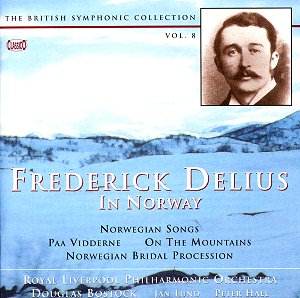A fascinating disc (all but the symphonic poem being
world premiere recordings) in the ever-burgeoning series of unknown
British symphonic music conducted by Douglas Bostock. One suspects however
that the music has been rediscovered and selected at the instigation
of the indefatigable Lewis Foreman. This is music written by Fritz
Delius (before the change of name to Frederick - a change he
made in 1902) under the age of thirty while studying in Leipzig between
1886 and 1888. In the summer of that middle year he made a walking tour
to Norway and in no time at all got to know Grieg and his wife as well
as Sinding and Halvorsen (ten years later Ibsen was another). This is
all before the time when Beecham or Wood championed him, no amanuensis
Eric Fenby on the horizon, and above all no paralysis and blindness.
Images of him at this time remind one of the young
Elgar, dashing and handsomely moustachioed, whilst the music has a distinctly
un-Delian style as epitomised by such later works as Walk to the
Paradise Garden, Sea Drift and so on, which makes it the
more intriguing. On the Mountains has Straussian melodies and
is lushly orchestrated, not heard between 1894 and 1946 when Beecham
revived it for the 1946 London Delius Festival. The seven songs were
originally conceived in German and for piano and voice, though Delius
did orchestrate two of them. Beecham subsequently did another two, R
Sondheimer scored one for the Festival referred to, and for the purposes
of this recording Anthony Payne has done a couple, as stylishly as his
realisation of Elgar Symphony No.3. The Danish Jan Lund’s lightweight
tenor voice is quaintly old-fashioned with its fast vibrato, and although
he may be stretched and given to spreading at climaxes such as in Hidden
love, it is still attractively expressive, despite being given to
intrusive diphthongs on his ‘a’ vowels, in a way reminiscent of Kim
Borg, the bass inexplicably chosen by Barbirolli for his recording of
Gerontius. Lund’s approach even infects the ‘old fashioned’ orchestral
style of playing in these charming songs such as string portamento.
The Norwegian Bridal Procession was the second
of three short piano pieces by Grieg, orchestrated by Delius in 1888.
It’s a cheerful, rustic piece of music resulting from Delius witnessing
such an event, and is the only example of Delius’s orchestration of
music by another composer. In Paa Vidderne the narrator Peter
Hall (not the theatre director but a lutenist with a fine speaking voice)
would have a hard time of it in a concert hall to overcome the full
sound of a symphony orchestra (even Grieg warned Delius of the problem)
and one suspects there may have been much cringing during the recording
sessions, for though fairly topical at the end of the 19th
century this is a style of declamatory melodrama we are not used to
these days. There are times when the text of Ibsen’s nine-part narrative
poem might have been penned by Barbara Cartland, but it must be seen
to be full of metaphors and not to be taken at face value (literally
a description of a young man’s departure from his mother’s home to undertake
a testing journey through the desolate wilderness of heather and rocks
of the high mountainous plateau of southern Norway, ‘the bleakest, wildest
place I [Delius] ever saw’). Frankly there is much fine music here and
at times one wishes the speaker would simply go away and leave one alone
to listen to it. It also makes one wonder how much of it would have
been heard in performance in days before amplification (even on this
CD he is not always audible), but as it took until 1981, and a television
production, before it was first played (in Norway) followed by its British
premiere in 1984, it probably has never failed in that regard. It is
glorious music and the RLPO play it for all it is worth, while Peter
Hall synchronises Lionel Carley’s English translation to perfection,
an essential feature of these melodramas. It may be an impractical proposition
to perform it but at the very least one should be grateful to have this
fine account.
Christopher Fifield
The
British Symphonic Collection


